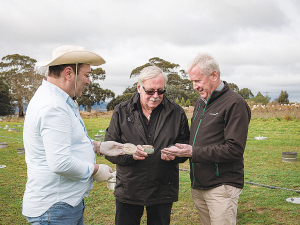Ravensdown partners with Footrot Flats to celebrate Kiwi farming heritage
Ravensdown has announced a collaboration with Kiwi icon, Footrot Flats in an effort to bring humour, heart, and connection to the forefront of the farming sector.
 From left, Dr Hosein Alizadeh and Professor John Hampton, Lincoln University and Mike Manning, Ravensdown at the research site.
From left, Dr Hosein Alizadeh and Professor John Hampton, Lincoln University and Mike Manning, Ravensdown at the research site.
A naturally occurring soil fungus is shaping as a new hero to improve nitrogen use on farm.
The fungi that can be applied to soil as either a prill or seed coating is part of a major new research programme launched last month.
N-Vision NZ, led by co-operative Ravensdown and co-funded by the Government’s Sustainable Food and Fibres Future (SFFF) initiative, aims to help farmers reduce nitrogen loss.
One of the projects in the $22 million, sevenyear initiative will harness the power of natural strains of soil fungi to increase the efficiency of nitrogen use by plants.
Ravensdown general manager of innovation and strategy Mike Manning says Lincoln University researchers have discovered natural strains of fungi that reduce the activity of specific microbes, which are involved with nitrogen cycling and losses.
“These nitrogen losses can occur as nitrate leaching through the soil which has potential detrimental effect on waterways, and as nitrous oxide, a potent greenhouse gas emission.
“Although it occurs naturally in pastural soils at a relatively low level, the fungi can be applied to soil as either a prill or seed coating.
"Doing so increases the level of the fungi and therefore alters the nitrogen cycle to reduce nitrogen losses.
“Research to date indicates this has a strong potential to mitigate both greenhouse gas emissions and reduce nitrogen loss to waterways,” he says.
N-Vision NZ includes two other research projects that aim to reduce the environmental impact of New Zealand’s grazed pasture systems: one that will develop an accurate gauge of the nitrogen already in the soil and, therefore enabling farmers to apply more precise quantities of nitrogen fertiliser for optimum plant growth; and another that will research nitrification inhibitors, which have the potential to significantly lower nitrous oxide emissions and nitrogen leaching from grazed pasture systems.
N-Vision NZ will apply leading-edge science and technology to create tools that farmers can use on farm. Importantly farmers will have options to maintain profitability while minimising the environmental impact of their land use.
The Government’s $7.3m contribution to N-Vision supports Ravensdown’s $11m cash contribution, plus in-kind funding. Lincoln University and Plant & Food Research are research partners for N-Vision.
Agriculture Minister Damien O’Connor says the research programme focuses on three technology streams.
N-Retain is a new nitrification inhibitor technology that will look at new ways to block the biological processes in the soil that lead to nitrous oxide emissions and nitrate leaching.
N-Test is a new soil test to inform nitrogen fertiliser decisions on pastoral farms, that will help capitalise on the nitrogen already in soil organic matter. This could mean less nitrogen fertiliser needs to be applied.
The third product, N-Bio Boost, is a fungal bio-inoculant to increase nitrogen use efficiency.
O’Connor says the ag sector needs innovative tools and technologies to help farmers reduce nitrogen fertiliser use on pastoral farms while maintaining production and profitability.
O’Connor said the products and technologies developed through the N-Vision NZ programme will be made widely available under commercial terms.
“This will ensure that the environmental and economic benefits extend to the whole of New Zealand and not just Ravensdown’s customers,” O’Connor says.
The World Wide Sires National All Day Breeds Best Youth Camp Best All Rounder plaudit has become family affair, with 2026 Paramount Cup winner Holly Williams following in her sister Zara's footsteps.
DairyNZ is giving New Zealand farmers a unique opportunity to gain hands-on governance and leadership experience within the dairy sector.
Herd improvement company LIC has posted a 5.2% lift in half-year revenue, thanks to increasing demand for genetics.
According to the latest Fresh Produce Trend Report from United Fresh, 2026 will be a year where fruit and vegetables are shaped by cost pressures, rapid digital adoption, and a renewed focus on wellbeing at home.
The Roar is a highlight of the game hunting calendar in New Zealand, with thousands of hunters set to head for the hills to hunt male stags during March and April.
OPINION: The past few weeks have been tough on farms across the North Island: floods and storms have caused damage and disruption to families and businesses.
OPINION: Fonterra may be on the verge of selling its consumer business in New Zealand, but the co-operative is not…
OPINION: What does the birth rate in China have to do with stock trading? Just ask a2 Milk Company.